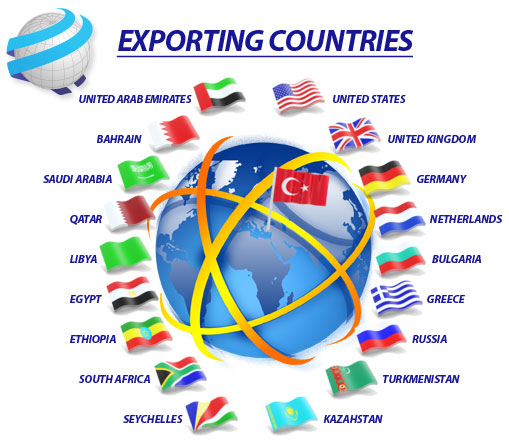The term export is derived from the theoretical meaning as to ship goods out of a port of a country. The seller of these goods is known as the ‘exporter’ who is based in the country and the overseas buyer is known as the ‘importer’. In international trade ‘exporting’ refers to selling goods or services produced in a country to other foreign markets.
Fruit is a popular export item, with exporting dating back to Christopher Columbus taking pineapples from South America to Spain in the 1400’s. Once a country has imported the fruit, they then portion the fruit depending on the ripeness of the fruit. For instance: Ripe strawberries, peaches and apricots will immediately be turned into canned jams and fruit jams.

The following is a list of the top ten exporting countries and revenue earned in 2012:
1 People’s Republic of China $1,898,000,000,000
2 United States $1,511,000,000,000
3 Germany $1,408,000,000,000
4 Japan $800,800,000,000
5 France $578,400,000,000
6 Netherlands $576,900,000,000
7 South Korea $556,500,000,000
8 Italy $522,000,000,000
9 Russia $498,600,000,000
10 United Kingdom $495,400,000,000
A country does not rely solely on importing and exporting fruit to earn a living. For instance, Zambia exports copper as their main source of revenue. A large import and export industry provides a boost in the economy and an increase of job creation. Jobs range from farm workers picking the fruit, to packers readying goods to be exported to the sells person trading the goods to the overseas market.
The fruit export industry has four definite skill areas: Commercial, technical, financial and logistics.
Commercial – This is the famer producing the fruits to be sold to overseas countries.
Technical – The role of a technical expert is to understand the market and work together with the famer to sell the right goods to the right foreign markets.
Financial – Producing, packaging and exporting goods costs money. A country needs to have the financial reserves to handle the pre-sells expenses.
Logistics – The apple grown on a farm in the middle of the Karoo does not automatically land in the grocery store in England. Logistics play the most important part of the export process. The truck needs to take the fruit from the cold store and keep it at that temperature through transferring into the storage warehouse, onto the ship and finally into the shop to sell in the importing country. This process is vital, because if the temperature changes there is a high possibility of the fruit spoiling and resulting in a worthless item that is not edible.
Exporting is a massive global industry. Countries have realized they cannot afford/are unable to produce all fruit products. As the population increases, so does the global demand for fruit. The advantage of this is a lower unemployment rate, as the exporting country requires more produce to meet the increasing demand.
Im Greg Jones and I love strawberry canned jams and fruit jams. I wrote this article in order to show how vital importing and exporting can be for countries and how it can create economic growth within the country.

